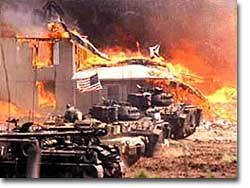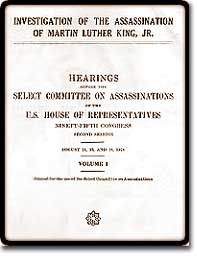6c. The Importance of Committees

A special committee investigated the government's actions in the 1993 tragedy involving a religious cult in Waco, Texas.
Bills begin and end their lives in committees, whether they are passed into law or not. Hearings from interest groups and agency bureaucrats are held at the committee and subcommittee level, and committee members play key roles in floor debate about the bills that they foster.
Committees help to organize the most important work of Congress — considering, shaping, and passing laws to govern the nation. 8,000 or so bills go to committee annually. Fewer than 10% of those bills make it out for consideration on the floor.
Types of Committees
There are four types of congressional committees:
- Standing committees, which continue from one Congress to the next, are probably the most important type because they consider and shape the vast majority of proposed laws. Standing committees can be combined or discontinued but most of them have been around for many years. Standing committees also conduct investigations, such as the Senate Banking Committee's investigation of President Bill Clinton's Whitewater investments.
- Select committees are temporarily formed for specific purposes, often to study a particular issue. They usually do not draft legislation. Some, like the select committees to investigate the assassinations of John F. Kennedy and Martin Luther King, are obviously intended to have limited lives. Others, like the Select Committee on Aging and the Select Committee on Indian Affairs, have existed for a number of years actually produce legislation. Sometimes long-standing select committees eventually become standing committees.

Most standing committees, such as the House Committee on Small Business, have their own websites and monthly journals to disseminate information to the people. - Joint committees have similar purposes as select committees, but they are made up of members from both the House and the Senate. They are set up to conduct business between the houses and to help focus public attention on major issues. Some joint committees handle routine matters, such as supervising the Library of Congress.

A select committee of Congress was established to investigate the assassination of Reverend Dr. Martin Luther King, Jr. - Conference committees are specially created when the House and the Senate need to reconcile different versions of the same bill. A conference committee is made up of members from the House and Senate committees that originally considered the bill. Once the committee agrees on a compromise, the revised bill is returned to both houses of Congress for their approval.
Committee Assignments
After each congressional election, political parties assign newly elected Representatives and Senators to standing committees. They consider a member's own wishes in making the assignments, but they also assess the needs of the committees, in terms of region of the country, personalities, and party connections.
Since the House has 435 members, most Representatives only serve on one or two committees. On the other hand, Senators often serve on several committees and subcommittees. Committee assignment is one of the most important decisions for a new member's future work in Congress. Usually, members seek appointment on committees that will allow them to serve their districts or state the most directly. However, a members from a "safe" district — where his or her reelection is not in jeopardy — and who wants to be a leader in Congress, may want to be named to a powerful committee, such as Foreign Relations, Judiciary, or the House Ways and Means. There they are more likely to come into contact with current leaders and perhaps even gain some media attention.
Standing Committees of Congress (as of 2021)
| HOUSE COMMITTEES | SENATE COMMITTEES |
| Agriculture | Agriculture, Nutrition, and Forestry |
| Appropriations | Appropriations |
| Armed Services | Armed Services |
| Budget | Banking, Housing, and Urban Affairs |
| Education and Labor | Budget |
| Energy and Commerce | Commerce, Science, and Transportation |
| Ethics | Energy and Natural Resources |
| Financial Services | Environment and Public Works |
| Foreign Affairs | Finance |
| House Administration | Foreign Relations |
| Judiciary | Health, Education, Labor, and Pensions |
| Natural Resources | Health, Education, Labor, and Pensions |
| Oversight and Reform | Homeland Security and Governmental Affairs |
| Rules | Judiciary |
| Science, Space and Technology | Rules and Administration |
| Small Business | Small Business and Entrepreneurship |
| Transportation and Infrastructure | Veterans Affairs |
| Veterans Affairs | |
| Ways and Means |







